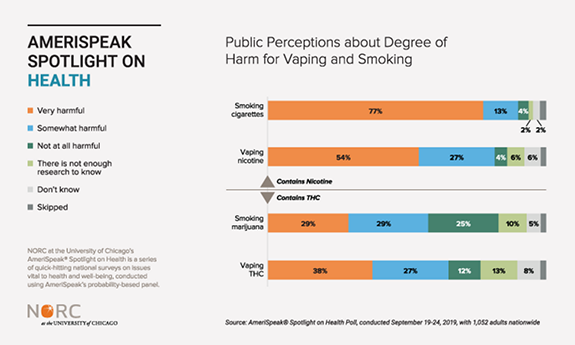Public Believes Nicotine-Based Smoking and Vaping Products Are More Harmful Than Those Containing THC
Following Vaping-Related Outbreak, Support Increases for Restricting Sales of Flavored E-Cigarettes or Outlawing Vape Products Entirely.
CHICAGO, Oct. 3, 2019 – Survey data show that Americans believe nicotine is a bigger public health threat than THC (tetrahydrocannabinol). According to researchers at NORC at the University of Chicago, almost all adults (90 percent) believe smoking cigarettes is harmful, and 81 percent believe vaping nicotine products is harmful. However, only 58 percent of adults believe smoking marijuana that contains THC is harmful, and 65 percent believe vaping THC is harmful.


Amerispaeak Spotlight On Health:
CHICAGO, Oct. 3, 2019 – Survey data show that Americans believe nicotine is a bigger public health threat than THC (tetrahydrocannabinol). According to researchers at NORC at the University of Chicago, almost all adults (90 percent) believe smoking cigarettes is harmful, and 81 percent believe vaping nicotine products is harmful. However, only 58 percent of adults believe smoking marijuana that contains THC is harmful, and 65 percent believe vaping THC is harmful.
Methodology
The self-funded poll was conducted between September 19 and 24, 2019, during a monthly Omnibus survey. It included 1,052 interviews with a nationally representative sample (margin of error +/- 4.24 percent) of adult Americans age 18+ using the AmeriSpeak® Panel. AmeriSpeak is NORC’s probability-based panel designed to be representative of the U.S. household population. A comprehensive listing of all study questions, tabulations of top-level results for each question.
About the AmeriSpeak Spotlight on Health
NORC at the University of Chicago’s AmeriSpeak® Spotlight on Health is a series of quick-hitting national surveys on issues vital to health and well-being, conducted using AmeriSpeak’s probability-based panel.
About NORC at the University of Chicago
NORC at the University of Chicago is an objective, non-partisan research institution that delivers reliable data and rigorous analysis to guide critical programmatic, business, and policy decisions. Since 1941, NORC has conducted groundbreaking studies, created and applied innovative methods and tools, and advanced principles of scientific integrity and collaboration. Today, government, corporate, and nonprofit clients around the world partner with NORC to transform increasingly complex information into useful knowledge.
References
High school vaping rates reported above are based on CDC, U.S. Food and Drug Administration, and National Cancer Institute analysis of data from 2011-2018 National Youth Tobacco Surveys.
More NORC Research on E-Cigarettes
NORC’s Social Data Collaboratory, led by senior fellow Sherry Emery, has been studying public health tobacco control efforts for more than two decades, primarily focusing on health communications research and specializing in analyzing the relationships between tobacco-related media, policy, and health behavior. Our noteworthy project, Tobacco Control in a Rapidly Changing Media Environment (NCI U01CA154254, 2011-2017)—which explored the relationships between tobacco-related information and marketing exposure (on both traditional and new media platforms, including social media), with individual and population-level tobacco-related knowledge, attitudes, and behavior—represented the first large-scale, national survey of new media consumption in the context of tobacco control. The project was incredibly timely and documented the introduction and rise of emerging tobacco product-related marketing (e.g., ENDS, JUUL, JUUL-compatible, little cigars and cigarillos, menthol and flavored products) in U.S. markets. The team published heavily on our findings, which can be found here, and which include several articles on novel social media analytical studies addressing ENDS and vaping product marketing and behavior.





